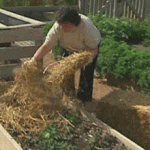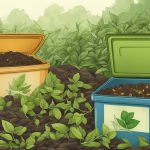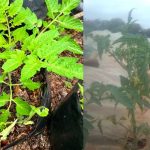Yes, compost can be used as mulch for plants and garden beds. When applied as mulch, compost helps retain moisture, suppress weed growth, and provide valuable nutrients to the soil.
Besides compost is a multi-purpose material that can also be used as Topdressing, Soil amendment, and Organic fertilizer.
Additionally, it improves soil structure and promotes beneficial soil microorganisms.
Compost mulch can be spread around the base of plants in a layer about 2-4 inches thick, making sure to keep it a few inches away from the plant’s stem to prevent rot.
To utilize compost as mulch effectively, consider the following steps:
- Mulch with 3-6″ compost layer.
- Add more compost periodically in summer.
- Mix compost into soil pre-planting.
- Adjust per soil type (clay/sand).
- Amend the entire bed, not holes.
- Add 1″ annually for gardens.
What Is The Purpose of Mulch in a Garden? (Compost Oriented)
Compost is an effective and eco-friendly mulch option for your garden. It improves soil health, retains moisture, and prevents weed growth, making it a versatile choice for gardening enthusiasts.
Mulch plays a crucial role in gardening, providing numerous benefits for your plants and the overall health of your garden.
Not only does it enhance the appearance of your garden beds, but it also helps improve soil quality, conserve soil moisture, and reduce weed growth.

How Mulch Improves Soil Quality?
Mulch is like a shield for the soil, just like how a roof keeps us dry during rain. It keeps the soil’s important nutrients safe when it rains a lot or when we water our plants.
Mulch also turns into good stuff for the soil as it breaks down. This good stuff is called organic matter, and it makes the soil strong and able to keep water and air in it.
They help break down old plant bits and make sure the soil has all the right stuff for plants to grow big and healthy. Here’s a table to show how mulch helps the soil:
| Mulch Benefit | What it Does |
| Retains soil nutrients | Protects nutrients from being washed away |
| Enhances soil structure | Makes soil better with more air and water |
| Promotes beneficial microbial activity | Gives tiny creatures a good home to help soil |
Advantages Of Using Compost As Mulch
When you use compost as mulch, it’s like giving your plants a natural vitamin boost.
Compost is full of nutrients like nitrogen, phosphorus, and potassium, which help your plants grow strong and healthy.
It’s like plant food that keeps on giving because the nutrients are slowly released into the soil.
Not only does compost make your plants happy, but it also makes the soil happy.
It helps the soil hold water and nutrients, and that means your plants won’t get thirsty as often, saving you time and water.
Plus, it prevents the soil from getting all squished, so your plant roots can stretch out comfortably and soak up the water they need.
Compost is like a tiny, invisible army for your garden.
It’s full of little helpers – the microorganisms – that work hard to break down stuff in the soil.
These little guys release even more nutrients and keep the garden free from bad bugs and diseases. It’s like having your very own garden superheroes!
And don’t forget about erosion and soil getting too hard like a rock.
Compost acts like a shield against the wind and heavy rain, keeping your soil safe and sound.
It also stops the ground from turning into a tough crust, so your plant roots have room to breathe and grow big and strong.
So, when you use compost as mulch in your garden, you’re giving your plants a healthy meal, making the soil happy, protecting against bad bugs, and keeping the soil safe from the weather.

Drawbacks Of Using Compost As Mulch
Using compost as mulch offers many benefits but comes with some potential limitations and drawbacks. Here are some key points to consider:
1. Risk Of Nitrogen Imbalance:
Fresh compost used as mulch can temporarily deplete the soil of nitrogen as compost microbes break down organic matter.
To prevent this, it’s advisable to age the compost or incorporate it into the soil before using it as mulch, ensuring a more stable nitrogen content.
2. Potential Attractiveness To Pests And Rodents:
Fresh compost, being moist and nutrient-rich, can attract pests like slugs, snails, and rodents.
Using a layer of other mulch materials on top of the compost can create a barrier between pests and your plants.
Regular monitoring and pest control measures can further reduce pest attraction to compost.
3. Potential Weed Seed Contamination:
Compost may contain weed seeds that can germinate and compete with your plants.
To address this, ensure that the compost reaches a high enough temperature during composting to kill weed seeds effectively.
Use a weed barrier like cardboard or landscape fabric before applying compost as mulch to minimize weed seed contamination.

Tips For Using Compost As Mulch Effectively
Here are some tips for using compost as mulch:
Spread 1 to 3 inches of compost across your garden in spring or fall.
Apply a three to six-inch layer of compost around the base of the plant.
Spread up to 2 inches of compost under the tree or shrub out to the drip line or edge of the bed.
Add a 2 to 4-inch layer of compost over the soil around all your perennials, extending the layer outward about 12 inches from the plants.
Periodically throughout the summer, you may need to add more compost over the old layers to maintain the benefits of the mulch.
Credit: jainsusa.com
Frequently Asked Questions
Is It Better To Use Mulch Or Compost?
Mulch and compost are not the same thing. Both have their own characteristic in their works. As an Agriculturist, I know both contain different amounts of nutrients (macro and micro). But after all, it depletes as
| Mulch | Compost |
| – Control weeds | – Increasing the production of food plants |
| – Retain moisture | – Getting more blooms on flowers |
| – Regulate temperature | – Encouraging plants to grow faster |
| – Enhancing soil health | |
| – Improving soil structure | |
| – Helping plants grow faster |
How Long Does Compost Last As Mulch?
Compost is a valuable source of nutrients for plants, offering nourishment for several months to a year, depending on the compost’s quality and the plant’s nutrient requirements.
The decomposition of compost varies, taking anywhere from two weeks to two years, influenced by factors like the compost materials and the balance of green and brown components.
In contrast, mulch, which can last for 4-7 years, is influenced by environmental factors such as direct sunlight and covering overly wet ground.
The decomposition rate of mulch also varies, with most bark and wood-chip mulches lasting at least a year.
However, mulches composed of leaves, lawn clippings, or sawdust break down more rapidly, often requiring multiple applications each year to maintain their effectiveness.

Is Garden Compost A Good Mulch?
Garden compost serves as an excellent mulch with several advantages, such as retaining moisture, suppressing weeds, enhancing soil quality, reducing pest and disease risks, and promoting faster plant growth.
To utilize compost as mulch effectively, apply a three to six-inch layer around the plant’s base and periodically add more layers throughout the summer.
Can You Use Just Compost In A Garden Bed?
Planting directly in compost is not recommended due to its lack of essential minerals, water retention, and structural support.
Instead, consider using compost to enhance your garden soil, topdress your lawn, mulch gardens, and houseplants, or mix it with native soil or a soil mix.
A good practice is to incorporate compost into your garden soil, making up at least 30-50% of the mixture for in-ground planting or creating your custom soil mix for raised garden boxes.
Conclusion
Compost can indeed be used as mulch in your garden. This organic matter not only helps retain moisture in the soil but also provides essential nutrients to your plants. As a layer of compost as mulch, you can suppress weeds, improve soil structure, and enhance overall plant health.
Overall, using compost as mulch is a sustainable and natural method to improve your garden’s health and yield, contributing to a healthier environment. So, don’t hesitate to give it a try and watch your plants thrive.
‘

I am a graduate of Bangladesh Agricultural University, where I delved into various agricultural disciplines, equipping me with a profound understanding of agriculture. Beyond academics, I have hands-on experience in gardening and crop cultivation. My passion is to embrace sustainable farming and horticulture. With a BSc in Agriculture, I am dedicated to promoting environmentally conscious and efficient agrarian practices.
Bachelor of Science (BSc) in Agriculture (Hons.)
Master of Science. (Sustainable Agriculture & Food Security ) (MS)
Bangladesh Agricultural University



